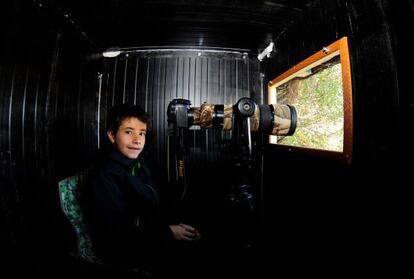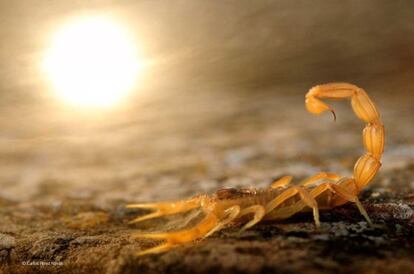Through the eyes of a child
Carlos Pérez Naval has become the youngest ever Young Wildlife Photographer of the Year

Ten-year-old Carlos Pérez Naval does not stop talking about photography. Lenses, cameras, focusing, exposures, filters – he’s quick to hold forth on anything to do with creating images. His picture of a scorpion at sunset has just made the youngster from Calamocha, a town in Spain’s eastern Teruel province, the youngest ever winner in the junior category of the Wildlife Photographer of the Year competition, organized on an annual basis for the past 50 years by the BBC and the Natural History Museum in London. “Not just that,” says his proud mom, Eva Naval. “He won his own category, for children under 10, and the Young Talents, which encompasses all the images by children and young people and is unveiled during the prize ceremony. It was a thrilling surprise.”
Carlos has spent half his life shooting photos – since he was four years old. “I don’t remember it that well, but I know the first photos I took were of flowers,” he says, slightly taken aback by the media attention he has received ever since the Duchess of Cambridge handed him the prize in London last week.

It all really got going when he was on a trip to China. “The first camera he used was a compact that we usually took urban photos with. But he gave that up and set about capturing flowers, at four years of age,” his mother explains. Later, his father, Rodrigo Pérez, passed on the SLR he used, a Nikon D200. “He wants bigger and bigger lenses – some of them look bigger than him!” his mom says with a laugh. Now Carlos looks through the viewfinder of a Nikon 7100 fitted with anything from a Sigma 150-500 mm to a Tokina fisheye lens.
“In the car he uses a Nikon 200-400 VR a lot, to keep the image steady,” explains his dad, who says he can’t put a price on being able to share his love of photography with his wife and son.
He wants bigger and bigger lenses – some of them look bigger than him” Carlos’s mom Eva Naval
“It’s not just fun,” Carlos says. “My mom and dad also take photos and I go with them – we spend a lot of time together with cameras.” Northern France, Arizona, India and the fields of Castilla are just some of the places where these two high-school teachers have taken Carlos, teaching him how to use binoculars, identify different bird species, and not get lost on a mountain.
“I love nature. Cities too, though not so much,” Carlos says. “City animals are much more used to people and it is easier to photograph them. In London we went to some parks that had ducks and I managed to get very close.”
Last summer in the Sequoia National Park in California he got close enough to be able to snap a bear cub. “I don’t usually get scared, although I always have to be careful because obviously a bear is something that could attack you.”
As well as photography, Carlos also loves breaded chicken, playing soccer with his friends and taekwondo. – “Like so many other children, he’s a normal boy,” say his parents. And he doesn’t just shoot: he also selects, categorizes and edits his pictures, “which are infinite,” jokes his father, who introduced him to Photoshop. “I taught him the little I know and in no time he was doing it on his own. It’s brilliant.” Carlos can spend hours in front of his computer, absorbed in thousands of photos, learning new techniques and choosing the best shot. The reality, though, is that Carlos is not an entirely ordinary boy.
Tu suscripción se está usando en otro dispositivo
¿Quieres añadir otro usuario a tu suscripción?
Si continúas leyendo en este dispositivo, no se podrá leer en el otro.
FlechaTu suscripción se está usando en otro dispositivo y solo puedes acceder a EL PAÍS desde un dispositivo a la vez.
Si quieres compartir tu cuenta, cambia tu suscripción a la modalidad Premium, así podrás añadir otro usuario. Cada uno accederá con su propia cuenta de email, lo que os permitirá personalizar vuestra experiencia en EL PAÍS.
¿Tienes una suscripción de empresa? Accede aquí para contratar más cuentas.
En el caso de no saber quién está usando tu cuenta, te recomendamos cambiar tu contraseña aquí.
Si decides continuar compartiendo tu cuenta, este mensaje se mostrará en tu dispositivo y en el de la otra persona que está usando tu cuenta de forma indefinida, afectando a tu experiencia de lectura. Puedes consultar aquí los términos y condiciones de la suscripción digital.









































